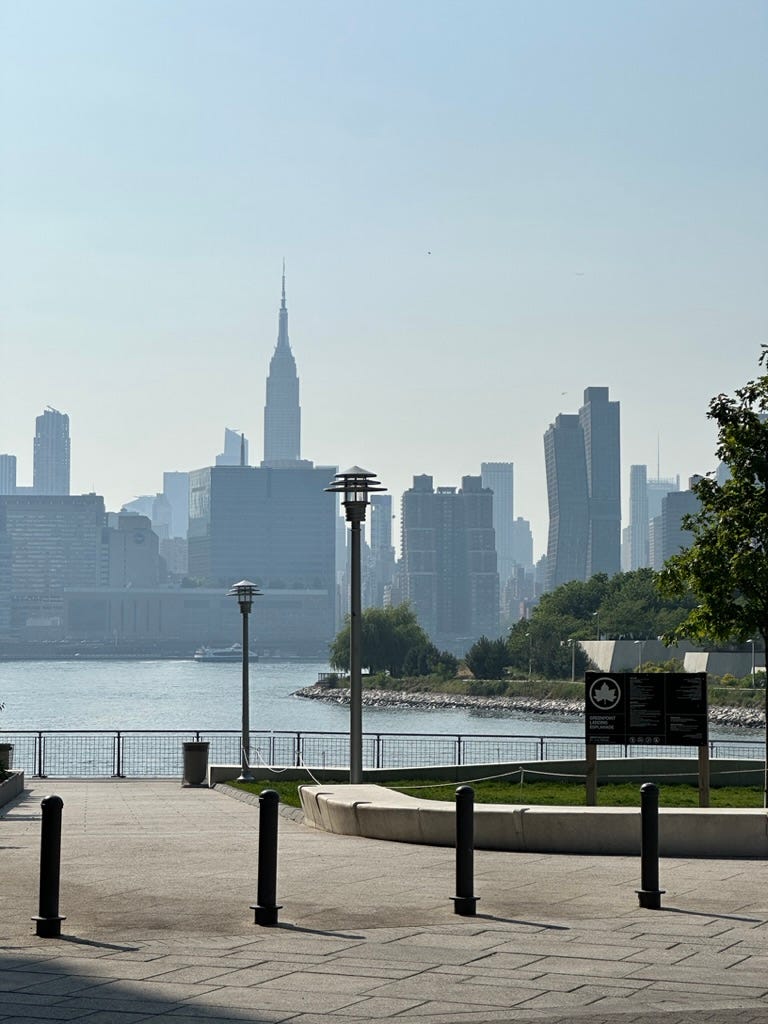Score
This is Western Coffee—notes on building the creative body. Last time: Roller coaster. The whole series is here. Please share this email; you can sign up free below.
There was a point in the later chapters of the TV show “Succession” when I thought, If someone could make more of this continuously, I’d melt into the couch. The show is over—and given its relatively niche audience, who knows how we’ll remember it—but a residue of enchantment remains with me. I think it was the best the medium has to offer. And I want to use it to talk about how a musical score can be not just an accomplice of the story but also the stage underneath it.
“Succession” is about a slashing competition for the inheritance of a family-controlled media conglomerate. Strange to say this about something so brutal, but over its first few seasons it evolved into a perfect synaptic fit for me, a form of heaven. Characters, setting, dialogue, pace, they all cohered into my desire for it never to end, which I associate with one particular scene: Here is Kendall Roy, the disinherited scion-turned-rival to his omnipotent father, confiding in his siblings (who don’t like him) about a past mistake—an addict’s distortion of judgment that begat an indelible crime. Briefly, the siblings sympathize. The show’s refrigerated case of corporate intrigue flash-melts into human melodrama, withering under the Tuscan sun in a parking lot made of dust.
Commentary on “Succession” sometimes tended to pick one of its modes or conceits and treat that in isolation: the beige outfits on the sterile private jets, or the running family knife fight (in the mud), or the toothsome satire of corporate logic, or—reductively—just terrible people doing terrible things, as if the moral arc ended where it began. But Kendall’s implosion at his mother’s wedding in that parking-lot scene revealed these strands not merely to coexist or even dance with one another but to link, as cause and effect do: the family knife fight lay faithfully across the contours of corporate logic; the beige was stainless cover for vicious acts and the blood they drew from their doers.
The show revealed this interconnectedness as it went along, but we could have sensed it earlier—through the composer Nicholas Britell’s theme song.
First let me say that I didn’t have any intrinsic love for that song. It felt gimmicky and faddish, which made its catchiness a weapon. Its carnivalesque twisting and strutting was like the mood-setter on loop in a fun house. Didn’t the opening of a show which, especially in its unofficial protagonist, Kendall, could be so solemn call for something a little less clownish?
Then, about as quickly as the show churned out its first conflicts, the musical variations began. Compare the first track of the Season 1 score with the second: The chord progression from that music-box jingle persists as the Titanic did once it got to the sea floor: iron-heavy, rusted out, and groaning. The gilded carnival is thin disguise for a watery grave.
The score’s ambiguity, its swerves within a single line from major to minor and back, from triumph to a death chill, with hints now and then of a regal glinting that dies out before we can see it—remind us that we’re watching a drama, in which the acts of individuals determine fates including but not limited to their own. People have noted how the show’s characters are insulated (in one direction) by their wealth from the world around them; it strikes me that they’re equally insulated from one another. The music-box theme betrays the brittleness of their sectioned fantasies; a scene or two later and a few octaves down, adagio strings shudder out the consequences.
By the time you get to the music of Season 4, the chords’ brooding has fractalized and bled—dripped down from glass-fragile tinkering into a slurring elegance. It’s the same music but layered and viscous, like a murder scene relocated to a chessboard. Listening to “Andante Espressivo” as I ran along the East River waterfront last week, a hazy Empire State Building grayed out against the afternoon sky, I thought: We live in Nicholas Britell’s New York. From the world’s most familiar filming location he crafted a place we’d never seen, a five-sense hologram.
Britell’s music doesn’t just accompany the work of Jesse Armstrong, the show’s nominal creator. It expands and makes way for it, recalling the Hemingway quote about how the writer can omit things he knows and, if he’s “writing truly enough,” the reader will know them. We learn the moral truth of “Succession” from its music—that its lightlessness is not predetermined but a genuine and contingent ending.
Kindly send me your thoughts, questions, and provocations: dmichaelowen@gmail.com. And say hi on Instagram, or let’s Peloton together: @leggy_blond.

